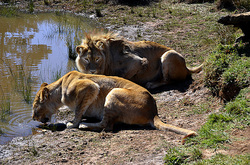
The Eastern Cape is the bloodiest of all the provinces. Of the more than a million animals that are sport hunted in South Africa every year, more animals are shot in the Eastern Cape than in any other province. And now, incredibly, provincial conservation services want to introduce trophy hunting of leopards for livestock losses. Leopards are threatened with extinction, and are listed as Appendix 1 of CITES.
There are only 35 leopards left in the Baviaanskloof reserve, a 200,000 hectare proclaimed international world heritage site. See www.baviaanskloof.net
PLEASE READ HOW YOU CAN HELP THE LEOPARDS OF THE BAVIAANSKLOOF
On the 9th February, 2011, after a lengthy campaign to force transparency on to a reluctant provincial conservation eventually prevailed, a one day workshop on the management of leopards was held in Port Elizabeth. The conference was well attended by about 80 people. The subject of the workshop was a Policy which has been signed off and approved by Phumla Mzazi, the senior manager for biodiversity in the province, which will permit the trophy hunting of so-called ‘Damage Causing Leopards’.
There are no provisions in the Policy to require farmers to take reasonable steps to prevent predation. No clauses require them to employ herders or to compel them to bring in their flocks at night. They can throw their sheep out unprotected in to the mouths of leopards – and then profit from the inevitable stock losses by selling the offending leopard to the hunting industry. That is what the approved Policy says.
Nine speakers gave presentations at the Workshop.
THE EXPERTS
Quinton Martins of Cape Leopard Trust, Liaan Minnie of Nelson Mandela Bay University, Bool Smuts and Jeanine MacManus of Landmark Foundation all made the point that the statistics show that less than 1% of stock losses in the province were caused by leopards and that killing a leopard would not solve the farmers problem since this would merely open up territory for another leopard to move in.
Some of the knowledge shared by the researchers were interesting:
1. By far the major food source for the Cape Leopard - up to 60% - consists of rodents.
2. Second on the predation list are Dassies, with Klipspringers third. Very few baboons get taken.
3. There are only 35 leopards left in the whole of the Baviaanskloof area.
4. Unless corridors are opened to connect the various fragments of wilderness left in the Cape, the Cape Leopard is doomed to extinction.
THE LANDOWNERS
Ernest Pringle of Eastern Cape Agri, representing the farmers, and Arthur Rudmen on behalf of the hunting industry, both gave angry, emotional presentations in favour of killing leopards, stressing the financial losses through predation of livestock. Both speakers demanded to be allowed to dictate management policies in the conservation areas, and to influence complex predator conservation policies to meet their own private financial concerns.
Rudman went further and alleged a conspiracy of international Animal Rights groups, working with local groups, to ‘destroy conservation by advocating sentimental and impractical solutions which favoured animal welfare over farmer’s rights.’ Pringle also issued a warning to the meeting that if farmers concerns were not addressed farmers would go into the conservation areas and kill every leopard there.
THE CONSERVATION OFFICIALS
It became quite clear at the meeting that the conservation officials were completely out of touch with the issue. For example Phumla Mzazi, replying to a question asking why farmers were not being prosecuted for illegally hunting leopards, stated “we have no knowledge of illegal hunting of leopards.” This astonished the whole meeting, since the Landmark Foundation has carefully documented and published the brutal deaths of at least 30 leopards in the Baviaans Area since November 2002.
This Policy is intended to compensate farmers for losses. Clearly, the officials have not done their homework. These compensation schemes have been tried all over the world and they always fail for the same two reasons:-
1. They promote poor and unsustainable farming methods.
2. The so-called “safeguards” are easily overcome by resourceful soldiers of fortune, and then the system becomes a money making racket.
None of the conservation officials had the slightest idea about the damage which this Policy would inflict upon legitimate tourism enterprises in the province. News of the Policy to trophy hunt endangered leopards in a world heritage site will travel virally through the Internet, reaching all corners of the pool of tourists. Ethical tour operators will boycott the province.
South Africa’s share of global tourism is already dismally small – less than one quarter of one per cent. Further loss of business by tourism facilities in the area (some are already operating at a loss) will cause staff retrenchment and unemployment.
Provincial conservation officials were so steeped in outdated farming practices that they confuse the perpetrator with the victim. Instead of trying to kill ‘problem’ leopards, officials should be working with agriculture extension officers to compel recalcitrant farmers to use sensible methods of stock management to mitigate predation. They should know that there is no such thing as a problem animal – there are only problem farmers.
The ignorance in Conservation structures extends beyond the provinces. Even National conservation officers obdurately refuse to focus on livestock management rather than predator control. Magdel Boshoff, of the National Department of Environmental Affairs, told the Workshop that in terms of the TOPS regulations, it was perfectly legal for farmers to hunt leopards by inhumane methods, including gin traps, baiting, poisons( including 1080!), dog packs and vehicles. She said they were even considering permitting the use of aircraft!
WHAT YOU CAN DO
Civil society now has a real chance to help save the Cape Leopard from extinction, and to save the Baviaans. The Baviaanskloof is a jewel of outstanding natural beauty which needs to be preserved for posterity. The Workshop may have shocked complacent officials out of their mindless appeasement of farmers’ never-ending complaints.
Now is the time to help officials to understand the wider issues around permitting the asset stripping of our wildlife heritage for purposes which are scientifically proven to be doomed to fail. We list below some relevant email addresses. If you care about the survival of the Cape Leopard, please send your protest, in polite language, spelling out the consequences of this foolish policy.
Ask them if they understand that this policy will:-
1. promote poor and unsustainable farming practices;
2. will not solve the predator problem;
3. confuses the perpetrator (farmer) with the victim (predator) and
4. fail to help the farmer.
On the other hand, it will surely:
1. impoverish our environment and push the Cape Leopard closer to looming extinction.
2. succeed in mobilising a mass boycott by ethical tourists of Eastern Cape and Baviaans tourism facilities, causing financial losses and unemployment.
3. Promote skewed social values: While millions of South Africans struggle to survive without the privilege of land ownership, here are a small number of landowners being given permits to asset-strip the surrounding public conservation land of its apex predators, for their narrow private gain. Why should taxpayers subsidise the hunting industry and wealthy landowners who are sitting on land worth millions?
You could ask government to attend to the following:
1. Obsolete livestock farming methods are neither compatible with conservation nor sustainable in the mountainous Baviaans landscape, and should be prohibited. The use of gin traps must be banned.
2. Delinquent landowners inside the Baviaanskloof must be evicted. Their land should be expropriated and integrated into conservation under the control of Eastern Cape Parks Board.
3. Conservation officials must understand how, when a predator takes livestock, it is the farmer - not the predator - who is to blame. It is so easy to farm among predators if one employs herders (thereby giving employment) and by bringing in the sheep overnight.
4. Listen to what the experts told you at the Workshop.
5. Prosecute the farmers who have killed leopards.
PLEASE WRITE TO THE FOLLOWING:
Eastern Cape Tourism [email protected]
Eastern Cape Conservation - Phumla Mzazi [email protected]
- Albert Mfenyana [email protected]
- Leon Els [email protected]
Dept of Environment - Magdel Boshoff [email protected]
- Thea Carroll [email protected]
E. Cape Parks Board - Tracey Steyn [email protected]
